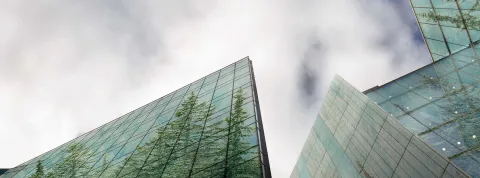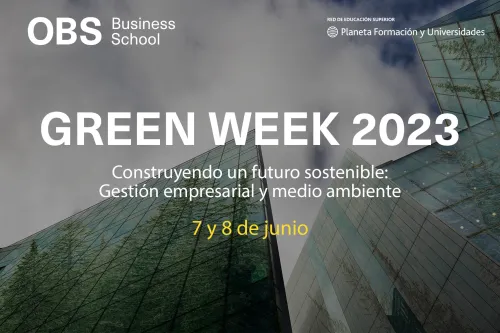
OBS celebrates its first Green Week 2023
Building a sustainable future: Business management and the environment
On the 7th and 8th of June, OBS held the first edition of its Green Week, an exclusive event for the school's Community moderated by Dr. Casilda Güell, Dean of OBS, which brought together more than 200 participants. Under the title ‘Building a sustainable future: Business management and the environment’, we had the pleasure of having the presence of high-level speakers, great professionals in the sector who work in internationally recognised companies.
Will we reach 2030 with the SDGs achieved?
Javier San Martín, school professor and managing partner at Ogaranzo Global Markets, opened the first day of the Green Week with an interesting presentation on the origin and evolution of the 2030 Agenda 2030 initiative and the Sustainable Development Goals (SDGs). ‘The great success of the 2030 Agenda was undoubtedly the fact that it got many countries to agree on such beneficial common goals. This is an unprecedented success of leadership’, said the report's author.
While meeting some of the goals mentioned is proving to be more complex than we would like - mainly because financing for the SDGs is not as forthcoming - San Martín is convinced that the efforts we have already begun to make will be worthwhile. ‘There will be many stones on the road to overcome; however, I have no doubt that this change will accelerate and we will reach 2030 with a large part of the goals met,’ he said.
How to develop an effective business sustainability plan
The last presentation of the day was given by Julio Blas, professor at OBS Business School and director of the Echar a Rodar project, a sustainability consultancy focused on helping companies analyse their value chain in order to apply CSR solutions.
Blas delved into what is expected of organisations when we talk about sustainability, pointing out that a company must adopt a transformative role capable of generating long-term and balanced value for all stakeholders in environmental, social, ethical and economic matters.
‘To develop a good sustainability plan, it is necessary for companies to have good interdepartmental communication, awareness and good communication within the sector,’ explained Blas.
When it comes to talking about what the future holds, the OBS professor ventured to say that in order to analyse how the perspective of keeping the values of an organisation alive and faithful to its corporate purposes is progressing, training will be essential. It is only through such training that we will be able to have the right professional profiles to overturn and analyse the data of these social expectations.
80% of the environmental impact associated with products could be avoided from the design phase
Dr. Berta Mota, Head of Circular Economy at Lavola, opened the second day of OBS' Green Week with a powerful presentation on sustainable strategies for product development.
But why is it important to talk about eco-design and why is this trend becoming more and more widespread? As Dr. Mota explained, ‘Speaking of eco-design is important because, as the European Commission published, 80% of the environmental impact associated with products could be avoided from the design phase’.
In a planet that has less and less capacity to regenerate itself, Dr. Mota unveiled the great environmental, economic and social benefits of the circular economy, a model that consists of preserving the value of the products we put into the system for as long as possible.
In addition, Dr. Mota talked about how minimising the extraction of resources and reducing the generation of greenhouse gases translates into a clear commitment to innovation, as well as the great advantages of the LCA (Life Cycle Assessment) methodology, which is essential to be able to base ourselves on real data and rely on more reliable communication.
Consumer Awareness Roundtable: How do companies reach their customers?
To end the second day of Green Week OBS, we had the presence of Beatriz Bayo, Director of Sustainability at Mango; Juan José Montiel, Founder of Citius Logistics and professor at OBS Business School; Guillem Bargalló, Head of Sustainability at IKEA Catalunya and Alba Linares, CSR Manager at Damm.
"Sustainability is already an imperative need. Despite the difficulties, companies have a duty to raise awareness in order to do things better", said Beatriz Bayo, speaking about the importance of companies adopting sustainable strategies that permeate all their areas.
However, as Alba Linares added, it is important not to get carried away by the now famous eco-anxiety. "It is important that the students who are listening to us know that we can go little by little. When we talk about sustainability, both in business and personally, every change counts and none is in vain: all small changes will lead to a bigger one".
Guillem Bargalló also touched on a very significant issue: the great value of honesty and humility when it comes to communicating the changes that companies are promoting in order to reach consumers. "It is not about always saying that we are the most sustainable. It is about being clear that our obligation is to work to achieve this transition towards sustainability; we are here to make the best possible company for this world".
It was Juan José Montiel who delved into such crucial issues as accessibility and hope. On the former, he said: "Sustainability, in order to be truly sustainable, has to be accessible to everyone, it cannot be restricted to a few". He also spoke of the importance of training and that schools like OBS Business School offer students from all over the world the possibility of becoming the leaders of the future that we need. ‘It is impossible not to be hopeful and optimistic when you see the work that the new generations are doing, students who are coming up with beautiful initiatives to accelerate sustainability in their societies.

